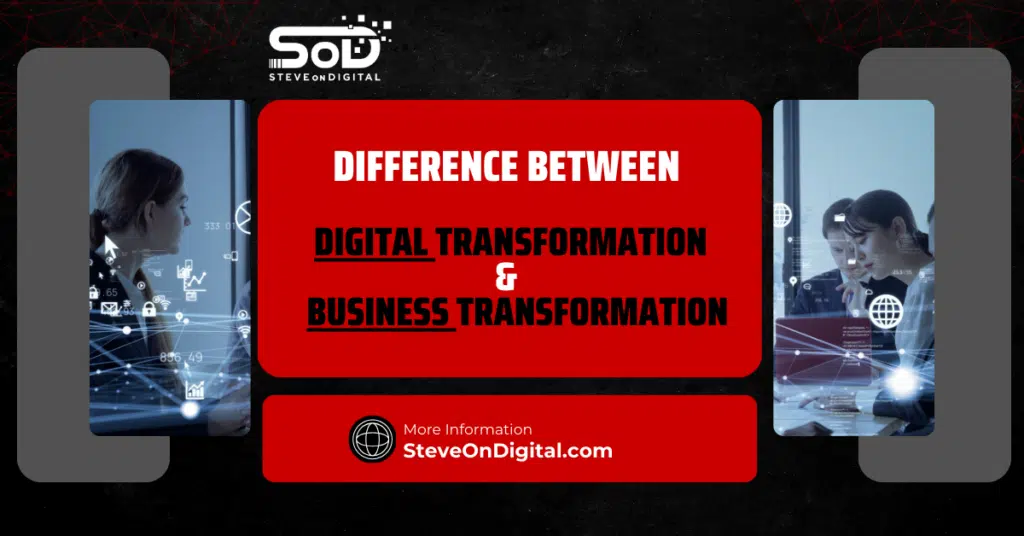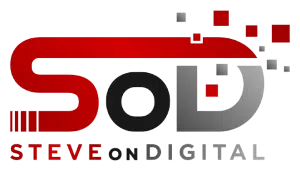Difference Between Digital Transformation And Business Transformation: A Clear Guide

Digital transformation involves integrating digital technologies into every part of a business to improve operations and customer experiences. Business transformation is broader, focusing on changing business models, processes, and culture to enhance overall performance. Understanding these differences is crucial. While digital transformation often focuses on technology, business transformation includes everything from strategy to operations. In this article, I’ll break down both concepts, sharing insights from my experience to help you determine which approach suits your business needs. I’m Steve, a digital transformation expert with a strong background in electrical engineering, an MBA, and a master’s in Project Management. I excel at helping SMEs navigate the digital landscape with practical insights. Let’s begin! Understanding Digital Transformation Digital transformation has become a buzzword, but what does it really mean? Let’s dive into the specifics and explore how it reshapes businesses. Definition Of Digital Transformation Digital business transformation involves integrating digital technologies across all facets of a business, fundamentally altering operations and enhancing the value delivered to customers. It’s not just about adopting new technology—it’s about using that technology to improve every facet of your business, from operations to customer experience. Key Drivers Of Digital Transformation Several factors drive the need for digital transformation. The rapid pace of technological advancements is a significant driver, forcing businesses to adapt or risk falling behind. Customer demands also play a crucial role, as today’s customers expect seamless digital experiences. Finally, competitive pressures push businesses to innovate continuously to stay ahead. Role Of Digital Technologies In Business Digital technologies are at the core of digital transformation. Technologies such as cloud computing, artificial intelligence, and machine learning enable businesses to automate processes, gain insights from data analytics, and enhance customer experiences. For instance, cloud computing offers scalability and flexibility, allowing businesses to adapt quickly to changing market dynamics. Exploring Business Transformation While digital transformation focuses on technology, business transformation is broader and encompasses changes to business models, processes, and culture. Definition Of Business Transformation Business transformation involves a fundamental change in how a company operates, with the goal of improving performance. This transformation can include changes to business models, organizational structures, and business processes. It’s about rethinking how your entire organization functions to improve efficiency, meet new challenges, and drive growth. Key Drivers Of Business Transformation Business transformation is driven by the need to adapt to evolving market dynamics, customer preferences, and operational inefficiencies. For example, changes in market conditions, such as increased competition or shifts in consumer behavior, can necessitate a transformation in how a business operates. Role Of Business Strategies In Transformation Strategic planning is vital for successful business transformation. Business leaders must develop and execute strategies that align with the organization’s goals, taking into account the internal and external factors driving the need for change. Leadership plays a critical role in guiding the transformation process, ensuring that changes are implemented effectively and sustainably. Key Differences Between Digital Transformation And Business Transformation Understanding the key differences between these two types of transformation is essential for selecting the right approach for your business. Scope And Focus Digital transformation is primarily focused on integrating digital technologies into existing processes to improve efficiency and customer experience. In contrast, business transformation has a broader scope, encompassing changes to the entire business model, processes, and organizational culture. While digital transformation may be part of a business transformation, the latter is more comprehensive and strategic. Technological Integration Digital transformation revolves around the adoption and integration of digital technologies like cloud computing and AI. Business transformation, on the other hand, may include technological integration but also addresses changes in business strategies, processes, and culture. It’s about ensuring that the entire organization is aligned and optimized to achieve its goals. Impact On Business Models Both digital and business transformations can significantly impact a company’s business model. Digital transformation may lead to new digital business models or enhancements to existing ones, while business transformation might involve a complete overhaul of how the company operates. For example, a company might shift from a product-based model to a service-based model as part of its business transformation. The Intersection Of Digital And Business Transformation In my experience, the intersection of digital transformation and business transformation is where the magic truly happens. These two concepts, while distinct, often converge in ways that can redefine how a company operates. I’ve seen firsthand how the integration of digital strategies within broader business transformation efforts can create a powerful synergy, leading to sustainable growth and innovation. Digital Transformation As A Subset Of Business Transformation Digital transformation is more than just adopting new technologies—it’s about embedding these digital technologies within the broader context of business transformation. When I work with businesses, I emphasize that digital transformation should not be seen as a standalone initiative but as a critical component of overall business transformation. This approach allows for a more holistic change that impacts every aspect of the business, from customer experience to internal processes. Leveraging Digital Tools For Business Transformation Digital tools are essential in facilitating business transformation. Tools like data analytics, cloud computing, and machine learning enable businesses to optimize processes, improve efficiency, and better meet customer demands. For example, I once worked with a small business that used data analytics to transform its customer engagement strategy, leading to a significant increase in customer satisfaction and loyalty. Leveraging these tools effectively can be a game-changer for any business looking to stay competitive in today’s digital landscape. Case Studies Of Successful Integration Real-world examples often provide the best learning experiences. I’ve seen numerous businesses successfully integrate digital and business transformation strategies, leading to impressive results. Take the case of a retail company I advised, which integrated robotic process automation (RPA) into its supply chain management as part of a larger business transformation. This move not only reduced operational costs but also improved supply chain efficiency, leading to a 20% increase in on-time deliveries. Digital Transformation Strategies Developing a clear and actionable digital transformation strategy is crucial. Without a well-thought-out plan, digital transformation

